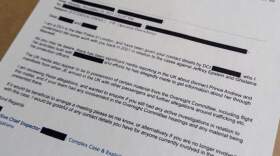Voters across Oklahoma started heading to the polls shortly after sunrise to cast ballots in Tuesday’s presidential primary elections.
It’s a noteworthy election for a few reasons. University of Oklahoma political scientist Keith Gaddie says polling data indicates the gap has narrowed between the Democratic hopefuls, former Secretary of State Hillary Clinton and Vermont Senator Bernie Sanders. He says Donald Trump still leads Sens. Marco Rubio and Ted Cruz, who are polling fairly evenly.
"Oklahoma is proving to be a battleground state as voters look to us to see how the appeals of Donald Trump and Bernie Sanders resonate with swing voters,” Gaddie said.
Most of the remaining contenders barnstormed through the state over the weekend. Rubio appeared at rallies in Oklahoma City Friday and Monday evenings, and also stopped in the Tulsa suburb of Jenks during a five-state tour Monday. Trump appeared a few blocks away in downtown Oklahoma City shortly after Rubio. Saturday morning former president Bill Clinton stumped for his wife in Edmond, marking his second stop in Oklahoma in six days. Sanders and Cruz held rallies Sunday afternoon at the same two venues occupied by Trump and Rubio two days earlier.
There are 43 Republican delegates at stake in Oklahoma on Tuesday. The state has 38 Democratic delegates up for grabs Tuesday, plus four so-called “superdelegates” who will pledge their support at the Democratic National Convention in Philadelphia in July.
“We're expecting substantial influence from the city districts in Tulsa and in Oklahoma City on the overall delegate count in the Democratic primary,” Gaddie said.
It’s only the eighth time in state history voters are casting primary ballots. Oklahoma was a caucus state until 1988, and U.S. Rep. Tom Cole told The Oklahoman’s Chris Casteel he thinks the old system shut too many people out:
Cole was chairman of the Oklahoma Republican Party when the state Legislature and then-Gov. George Nigh approved the change. “If the people of Oklahoma are ever going to have an opportunity to have a voice in who is president of the United States, we need to move to ‘Super Tuesday,' ” Nigh said then. . . . “It ought to be an open process with as many people participating as possible,” Cole said in an interview last week. “I knew we would be the center of attention, we'd get a lot of competition and we'd get a great turnout.”
State figures indicate nearly 602,000 voters turned out for those first primaries 28 years ago, compared with just a few thousand that caucused.
Historic Pres. Primary Turnout (Rep)
— Oklahoma State Election Board (@OKelections) February 25, 2016
'88 = 208,938
'92 = 217,721
'96 = 264,542
'00 = 124,809
'04 = 66,198
'08 = 335,054
'12 = 286,523
Historic Pres. Primary Turnout (Dem)
— Oklahoma State Election Board (@OKelections) February 25, 2016
'88 = 392,727
'92 = 416,129
'96 = 366,604
'00 = 134,850
'04 = 302,385
'08 = 417,207
'12 = 112,771
The Oklahoma State Election Board says about 35,000 people cast ballots during the early voting period that took place from Thursday through Saturday, with about 14,000 more mail-in absentee ballots.
Tuesday’s primary is also the first election cycle where a major political party in Oklahoma has allowed independents to vote in its election. Democrats opened their process last year, but Republicans are still holding closed primaries.
Oklahoma State University political scientist Jeanette Mendez told USA Today’s Trevor Hughes Sooner State independents are more than just center-leaning voters who don’t identify with Republicans or Democrats:
Instead, they’re a mix of centrists, ultraliberals and libertarians. Political experts don’t quite know how that’s going to shake out. “You’ve got a very big group of libertarians,” said Russell Griffin, the executive director of the Oklahoma Democratic Party. Sanders is trying to capitalize on those independents who traditionally haven’t participated in the primaries, Mendez said.
State Election Board Secretary Paul Ziriax says so far independents have made up about 2-3 percent of early and absentee voting.
"Just because you're independent does not mean that you're required to vote a Democratic ballot,” Ziriax said. “There could be a county question or some non-partisan issue that you're showing up to vote for, and you may not want to vote a Democratic ballot, and I'm sure there are a number of independents that fit that vote as well."
Ziriax says the State Election Board wanted to make sure all 77 counties had consistent messaging about how the process works for independents, and he said so far he hasn't heard of any significant issues.
"I haven't heard any credible complaints that someone was, for example, denied a Democratic ballot because they were an independent,” Ziriax said. “And I think in every case during early voting the county election boards seemed to be doing a very good job of making sure they're following proper protocol."
Before you vote: Use the online voter tool to confirm your voter registration, find your polling place, & more! https://t.co/XuNLmunLw1
— Oklahoma State Election Board (@OKelections) February 29, 2016
Polls are open until 7 p.m., and voters should have with them either a valid federal, state, or tribal photo ID, a voter ID card, or an affidavit with their provisional ballot.
KGOU produces journalism in the public interest, essential to an informed electorate. Help support informative, in-depth journalism with a donation online, or contact our Membership department.






